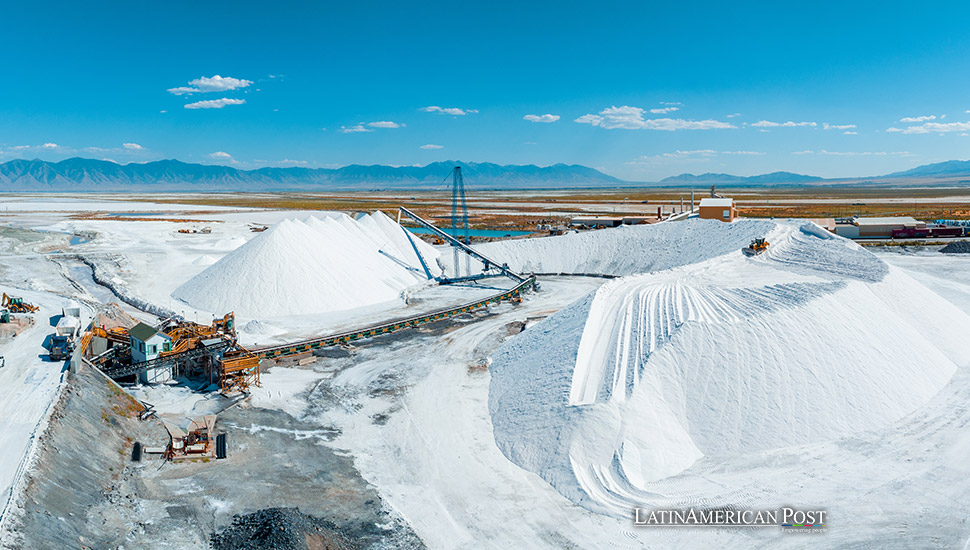China’s Quest for Lithium in Latin America Faces Major Hurdles

As Chinese firms seek lithium, a key element in electric vehicle (EV) batteries, in Latin America, they face increasing resistance due to environmental concerns, political challenges, and nationalistic policies in countries like Chile, Bolivia, Mexico, and Peru.
Latin America’s Lithium Treasure and China’s Growing Demand
The global electric vehicle (EV) market continues to surge, driven by the growing demand for cleaner energy solutions. China, as the world’s largest producer of EVs, is heavily reliant on lithium, a crucial component in the production of EV batteries. In 2023, Chinese EV exports amounted to a staggering $34.1 billion, according to data from the South China Morning Post (SCMP). China’s lithium needs will increase to sustain this production level in the coming years. Latin America, home to more than half of the world’s lithium reserves, has become a key focus for Chinese firms eager to secure a stable metal supply.
Countries like Chile, Bolivia, Mexico, and Peru hold vast lithium reserves, drawing global investors’ attention. However, the situation on the ground is far from straightforward. Chinese companies are encountering political, environmental, and legal hurdles as they try to tap into these reserves. While many Latin American nations are eager to attract foreign investment, they are also increasingly aware of the strategic importance of their lithium resources. They are taking steps to ensure that foreign companies do not simply extract and leave but contribute to local economies.
The competition between China and other international players, including the United States, adds another layer of complexity. In recent years, the U.S. has expressed concern about Chinese influence in Latin America’s mining sector, raising the stakes for all involved. General Laura Richardson, head of the U.S. Army’s Southern Command, even called U.S. access to lithium in Latin America a matter of “national security,” according to SCMP interviews and reports.
Nationalism and Environmental Concerns Slow Chinese Progress
While Chinese companies have had some success in securing lithium projects in Latin America, they are increasingly facing resistance from host governments concerned about the environmental and economic impact of foreign mining operations. In April 2023, Chile announced plans to nationalize its lithium sector, which sent shockwaves through the global mining community. Chinese EV giant BYD has been negotiating with the Chilean government since 2022 over a lithium project, but progress has been slow. The Chilean government and the state-owned Sociedad Química y Minera de Chile (SQM) have been haggling with BYD over pricing and environmental protection issues.
According to analysts quoted by SCMP, Chile is determined to move up the value chain and leverage its lithium resources for economic development. “The Chilean government wants to move up the value chain, and BYD’s project in Chile accomplishes this,” said Jesse Rogers, head of Latin America economics at Moody’s Analytics. However, despite BYD’s willingness to share technology and expertise, the sector’s nationalization has complicated negotiations.
Bolivia, which holds some of the world’s largest lithium reserves, has similarly placed strict controls on foreign investment in its lithium industry. The exploitation of lithium is tightly controlled by the government, with state participation required in any new project. In January 2023, Chinese battery firm Contemporary Amperex Technology Limited (CATL) signed a deal with Bolivia’s state-owned lithium company. Still, progress has been slow as Bolivia continues to raise legislative barriers that deter foreign investment.
Mexico’s government took a hardline approach to lithium in 2022, nationalizing its lithium resources and canceling mining concessions held by private companies, including those of China-based Ganfeng Lithium. According to the SCMP report, Ganfeng has since filed an arbitration case against the Mexican government over the canceled contracts. The arbitration process could drag on for years, leaving China’s access to Mexico’s lithium reserves in limbo.
Peru, a relatively new player in the lithium market, has also become a battleground for Chinese firms seeking access to its resources. In March 2024, Peru’s port authority nearly revoked the operating rights of a Chinese state-owned subsidiary for the Chancay port, which would be vital for exporting lithium from South America to Asia. Though the proposal was later withdrawn, it underscored Chinese firms’ political risks in Peru, where environmental and protectionist concerns weigh heavily on government decision-making.
U.S.-China Rivalry Complicates Lithium Investment
As Chinese companies work to navigate the regulatory landscapes of Latin American countries, the economic rivalry between the U.S. and China is also influencing the region’s lithium sector. The U.S. government has ramped up efforts to secure lithium supplies for its growing EV industry and to edge out Chinese firms from key mining projects in the region.
In Bolivia, where China has significant lithium interests, there is speculation that the U.S. is quietly pressuring the Bolivian government to limit Chinese involvement in the country’s mining sector. Jesse Rogers told the SCMP, “There is growing talk in the U.S. about the need to secure lithium reserves in Latin America and edge Chinese firms out.”
The geopolitical dynamics surrounding lithium in Latin America mirror broader trends in the global economy, where competition between China and the U.S. is increasingly shaping investment decisions. Latin American countries, while eager for foreign investment, are wary of becoming pawns in a broader geopolitical game. Many seek to strike a balance, welcoming investment from China and the U.S. but placing stricter conditions on foreign firms to ensure their mining operations provide tangible benefits to local economies.
Environmental concerns also drive the growing scrutiny of Chinese investment in Latin America’s lithium industry. Lithium extraction is a resource-intensive process that can have significant ecological impacts, particularly in fragile ecosystems such as the salt flats of Bolivia and Chile. As Latin American governments become more environmentally conscious, Chinese firms are asked to demonstrate their commitment to sustainable mining practices.
China Adapting to the Changing Landscape
Despite the numerous challenges, Chinese firms remain committed to securing lithium supplies from Latin America. To circumvent some political and environmental obstacles, Chinese companies are adopting new strategies to strengthen their position in the region.
Chinese lithium giant Ganfeng has invested heavily in local lithium projects in Argentina. Between 2020 and 2023, Chinese companies poured $3.2 billion into Argentinian mining, including seven lithium operations. According to the SCMP, Argentina and Brazil are considered “safe” countries for Chinese investors, as their governments have been more welcoming of foreign investment and have enacted liberalized mining policies that favor international partnerships. Ganfeng, for example, took a $70 million stake in an Argentinian lithium brine project in March 2024, signaling its long-term commitment to the region.
Brazil, another key player in the global lithium market, has also become a strategic target for Chinese firms. BYD, for example, is planning to build an EV factory in Brazil to process lithium for the international market. Chinese firms are positioning themselves as long-term partners in the region’s economic development by investing in local production facilities. Analysts told the SCMP that this strategy allows Chinese companies to present themselves not just as resource extractors but as contributors to the local economy through job creation and technology transfer.
At the same time, Chinese firms are exploring new extraction methods to boost lithium recovery rates and reduce the environmental impact of mining. According to Yuan-Sheng Yu, managing director at Lux Research, Chinese miners are developing technologies to increase lithium recovery rates from 40-60% to 70%. These new methods, which could be commercialized within five years, would allow Chinese companies to extract more lithium with less environmental damage, potentially easing some of the concerns raised by Latin American governments.
Analysts cited in the SCMP report emphasize that China’s technological edge in lithium extraction could give it an advantage in negotiations with skeptical Latin American governments. “China is the world’s strongest in terms of technical ability to extract lithium ore,” said Zhao Xijun, a finance professor at Renmin University in Beijing. Chinese firms hope to secure long-term access to Latin America’s lithium reserves by focusing on joint development projects that include technology transfer and environmental safeguards.
The Future of China’s Lithium Quest in Latin America
As the world’s largest EV producer, China’s need for lithium will only continue to grow in the coming years. Latin America, with its vast reserves of the metal, is a key part of China’s strategy to secure the resources it needs to maintain its dominance in the global EV market. However, Chinese firms are facing increasing resistance from Latin American governments, which are imposing stricter environmental, political, and legal conditions on foreign investment.
As detailed in the SCMP report, the challenges for Chinese companies are significant, but they are not insurmountable. By adopting new extraction technologies, investing in local production facilities, and navigating complex political landscapes, Chinese firms can still secure their place in Latin America’s lithium sector. However, the competition with the U.S., combined with growing nationalistic sentiment in countries like Mexico and Bolivia, means that the road ahead will be fraught with difficulties.
Also read: Jamaica’s Economic Turnaround is a Lesson for Latin America
Ultimately, the success of China’s lithium quest in Latin America will depend on its ability to balance the demands of host governments with the need to secure vital resources for its booming EV industry.




